Psoriasis
Psoriasis is a skin condition that causes red, flaky, crusty patches of skin covered with silvery scales. Psoriasis can cause itching or soreness. See your GP if you think you have psoriasis.
Symptoms of psoriasis
Psoriasis typically causes patches of skin that are dry, red and covered in silver scales.
These patches normally appear on your elbows, knees, scalp and lower back, but can appear anywhere on your body.
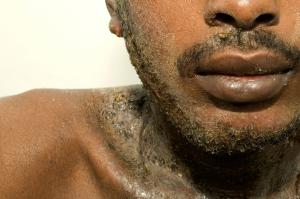
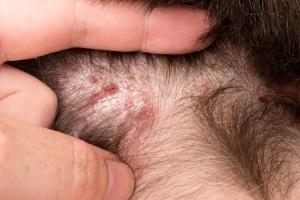
Most people are only affected with small patches. In some cases, the patches can be itchy or sore.
There are several different types of psoriasis.
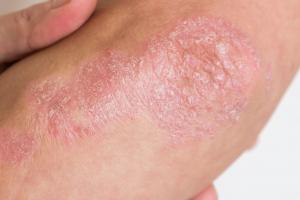
Many people have only one form of psoriasis at a time, although two different types can occur together.
Guttate psoriasis also known as ‘tear drop’ or ‘rain drop’ psoriasis, is a widespread rash of small spots.
It can occur at any age, but tends to occur most often in children, adolescents and younger adults.
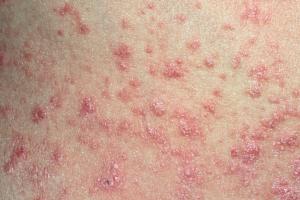
Usually, guttate psoriasis is widespread across the torso, back and limbs, and clears up after several weeks or months, depending on how quickly treatment is started.
Some people may continue to have flares from time to time, or find it evolves into one of the other types of psoriasis
One type may change into another type, or become more severe.
Most cases of psoriasis go through cycles, causing problems for a few weeks or months before easing or stopping.
See your GP if you think you may have psoriasis.
What causes psoriasis
People with psoriasis have an increased production of skin cells.
The build-up of skin cells creates the patches associated with psoriasis.
Although the process isn't fully understood, it's thought to be related to a problem with the immune system.
Many people's psoriasis symptoms start or become worse because of a certain event, known as a "trigger".
Possible triggers of psoriasis include:
- an injury to your skin
- throat infections
- using certain medicines
The condition isn't contagious. It can't be spread from person to person.
How psoriasis is diagnosed
Your GP can often diagnose psoriasis based on the appearance of your skin.
You may be referred to a dermatologist (a specialist in diagnosing and treating skin conditions) if your doctor is uncertain about your diagnosis, or if your condition is severe.
If your doctor thinks you have psoriatic arthritis, which is sometimes a complication of psoriasis, you may be referred to a rheumatologist (a doctor who specialises in arthritis).
Treating psoriasis
There's no cure for psoriasis.
A range of treatments, including creams and ointments, can improve symptoms and the appearance of skin patches.
The health professional looking after your care will discuss treatment options with you.
Living with psoriasis
For some people, psoriasis is just a minor irritation. But, it can have a significant impact on quality of life for those more severely affected.
For example, some people with psoriasis have low self-esteem because of the effect the condition has on their appearance. This may be associated with anxiety or depression.
It's also quite common to develop tenderness, pain and swelling in the joints and connective tissue. This is known as psoriatic arthritis.
Psoriasis can affect both fingernails and toenails. About half of those with psoriasis may have nail involvement.
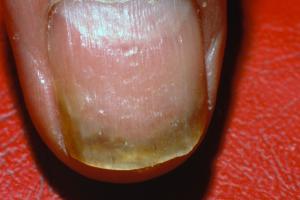
Most of those who develop psoriatic arthritis will also have nail involvement. Fingernails are more often affected than toenails.
Speak to your GP or healthcare team if you have psoriasis and you have any concerns about your physical and mental wellbeing.
They can offer advice and further treatment if necessary.
There are also support groups for people with psoriasis.
More useful links
The information on this page has been adapted from original content from the NHS website.
For further information see terms and conditions.